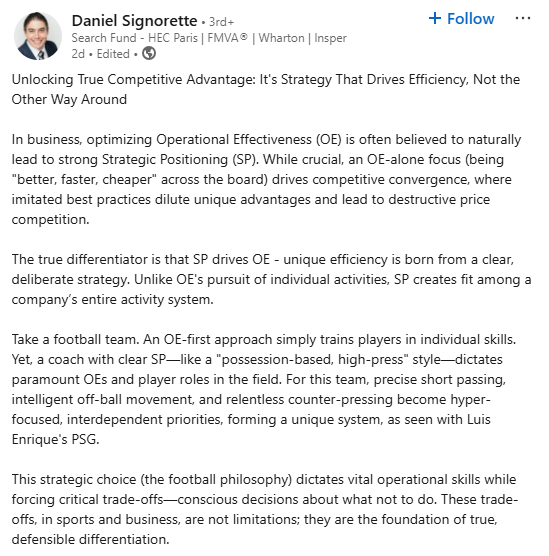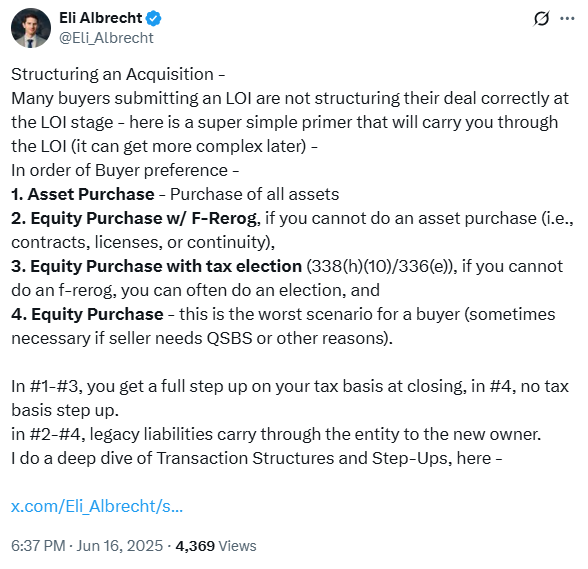Take Five #163: New U.S. Bank Small Business survey shows 37% of owners are eyeing an exit, but most lack a formal plan, and more
Top five must-reads this week in the world of SMB acquisitions and operations
Subscribe to Take Five to get our top 5 quick weekly reads on the world of SMB, M&A, and EtA from the team at Kumo. Kumo aggregates hundreds of thousands of deals into one easy-to-use platform so that you can spend less time sourcing, and more time closing deals.
Take Five is created and sponsored by Kumo, a powerful deal aggregator to help supercharge your deal sourcing at withkumo.com.
What can you do with Kumo?
Browse 120,000+ deals from hundreds of brokers and every major marketplace, with 700+ unique deals added daily.
Save time and stop reviewing duplicate deals. Kumo matches identical deals across hundreds of sources so you can view unique business opportunities, even if they’re slightly different across different websites.
Get a daily email for deals that match your search criteria.
Take Five #163: New U.S. Bank Small Business survey shows 37% of owners are eyeing an exit, but most lack a formal plan, and more
1. “Unlocking True Competitive Advantage: It's Strategy That Drives Efficiency, Not the Other Way Around”
2. Some red flags to watch for when reviewing a franchise’s framework
3. How to dodge earnout agreement issues and keep your deal on track
Define Financial and Performance Metrics
The backbone of any earnout agreement is selecting the right financial metrics. Studies indicate that 50%-80% of earnouts rely on either EBITDA or revenue as their primary metric. Each option has its strengths, depending on the business's specific needs.
Revenue-based targets are straightforward and focus on top-line performance. They’re less prone to manipulation through accounting adjustments. This makes them ideal for businesses with steady income streams or when short-term growth is a priority.
EBITDA (Earnings Before Interest, Taxes, Depreciation, and Amortization) is a measure of operational performance, offering a clearer view of how efficiently the business is running. It’s a suitable choice when operational improvements are the focus rather than just boosting sales. However, calculating EBITDA can be more complex, often requiring detailed accounting definitions.
Net income targets take a broader view, reflecting overall profitability. While this metric provides a complete financial picture, it can be influenced by external factors like tax rate changes or interest expenses, which may be beyond the seller's control.
4. LOI deal structures ranked: what buyers prefer and why it matters early in the process
5. New U.S. Bank Small Business survey shows 37% of owners are eyeing an exit, but most lack a formal plan
Handing the Reins to the Next Generation
With more than half of U.S. small business owners now over age 55, succession planning is becoming increasingly urgent. While many owners are not yet ready to step away – with only 54% having created a succession plan – new generations are preparing to take their place: more than one-third (36%) of Gen Z and Millennial owners say they plan to acquire a business from a retiring owner.
The report reveals a striking gap between intention and action. While 85% of surveyed participants say they originally became an owner to create something they could pass on, and 84% wanted to create generational wealth for their family, only 54% have a formal succession plan in place.
A growing number of owners (62%) have seen their retirement timelines accelerate in the past five years. But for many, navigating succession is a challenge:
62% find the process overwhelming
56% worry they won’t get a reasonable price for their business when it’s time to sell
53% lack the proper resources or guidance to plan for the future of their business
Nearly 4 in 10 small business owners (37%) say they plan to sell their business in the next 12 months, suggesting how quickly transitions of ownership may be approaching for some businesses. However, retiring business owners are not the only ones looking to sell, with a higher number of Gen Z and Millennial owners (41%) than Boomers and Gen X (33%) saying they plan to sell their business.
Read the rest of U.S. Bank’s article here.
Loved what you read? Subscribe to Take Five to get our top quick reads every week from the team at Kumo. Kumo aggregates thousands of sources into one easy-to-use platform so that you can spend less time sourcing, and more time closing deals.









